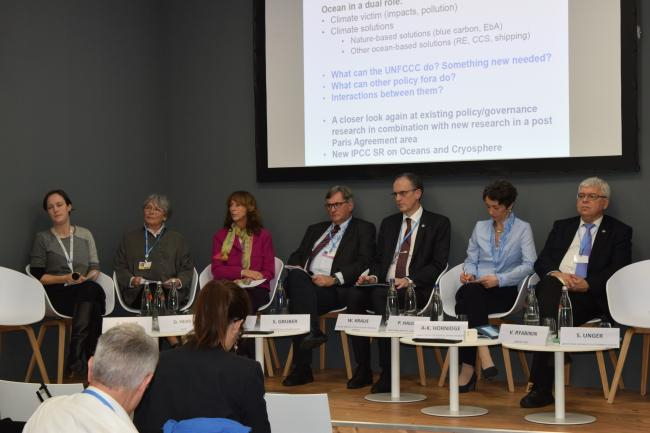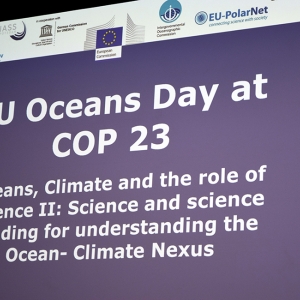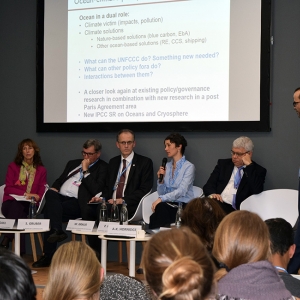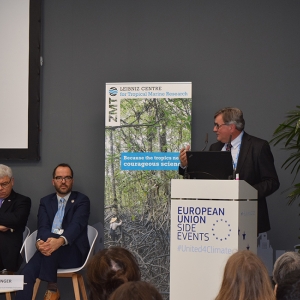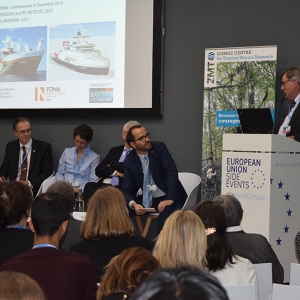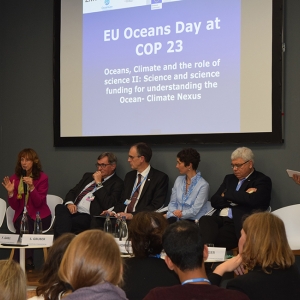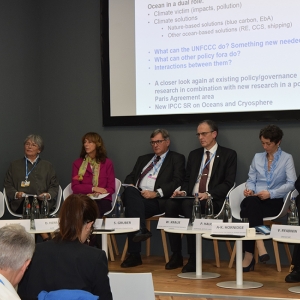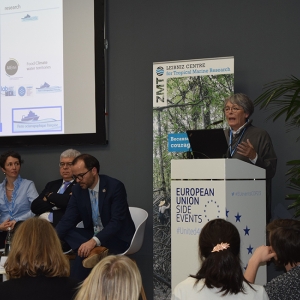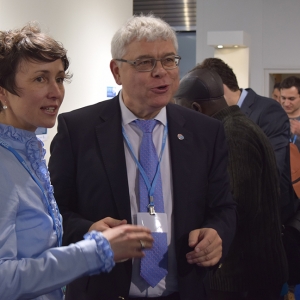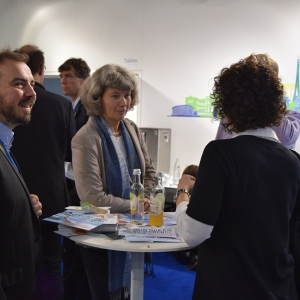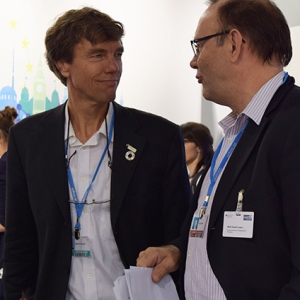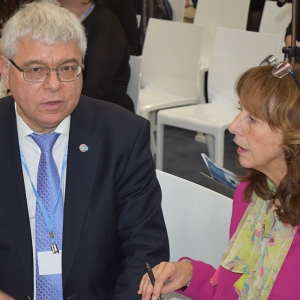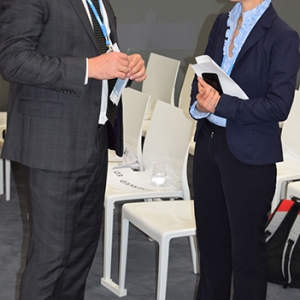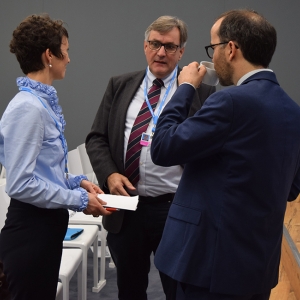23.11.17 | In November 2017, the UN Climate Change Conference 2017 (COP23) under Presidency of the Government of Fiji took place in Bonn. Up to 25,000 participants from science, diplomacy, politics and civil society attended the conference. Scientists from the Leibniz Centre for Tropical Marine Research (ZMT) hosted side events or gave talks at the COP23.
Within the frame of the European Union side events Prof. Dr. Anna-Katharina Hornidge, head of the department Social Sciences at ZMT, hosted a panel discussion together with the German UNESCO Commission, the Institute for Advanced Sustainability Studies (IASS), EU PolarNet, the COST-Action network „Ocean Governance for Sustainability“ and GEOMAR Helmholtz Centre for Ocean Research.
Titled „Oceans, Climate and the Role of Science II - Science and Science Funding for Understanding the Ocean-Climate Nexus“ and held at the EU Pavilion (November 10) this high-profile side event reflected on the European marine science scape in and for climate policies bringing together donor representatives from the EU and selected member states, policy makers, marine scientists and representatives from international NGOs and UN organisations.
Dr. Vladimir Ryabinin (Executive Secretary of the UNESCO IOC, France and Prof. Dr. Anna-Katharina Hornidge (Professor of Social Sciences, Leibniz Centre for Tropical Marine Research (ZMT) and Chair of the COST Action ‘Ocean Governance for Sustainability’, Germany) gave the welcome addresses leading up to the panel discussion with renowned scientists, policy-makers and the NGO sector.
Photos: Elke Kaspar, ZMT
Featuring MinDirig Wilfried Kraus (Deputy Director General ‘Sustainability, Climate, Energy’, Federal Ministry of Education and Research - BMBF, Germany), Prof. Dr. Peter Haugan (Professor at the Geophysical Institute, University of Bergen - UiB and Research Director II at Institute of Marine Research and Chair of UNESCO IOC, Norway), Ms Sieglinde Gruber (Head of Unit ‘Marine Resources’ and Directorate General for Research and Innovation, European Commission, Belgium), Dr. Françoise Gaill (Director of the Department of Environmental Sciences and Sustainable Development at the National Center for Scientific Research (CNRS), France) as well as Ms Dorothée Herr (Manager Oceans and Climate, IUCN, Germany) the discussion focused on existing funding mechanisms, expected scientific output production and key structural challenges in the match of marine sciences for climate politics. Based on these discussions, a science policy brief was developed as a contribution to the further development of the European marine science scape for and in climate politics.
Dr. Renuka Badhe (Chair of the Expert Advisory Board of the EU PolarNet and Executive Secretary of EU Polar Board, The Netherlands) and Mr Sebastian Unger (Chair of the side event and Head of Ocean Governance Research Area at the Institute for Advanced Sustainability Studies - IASS, Germany) brought this side event to a close.
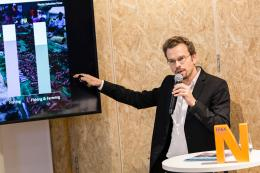
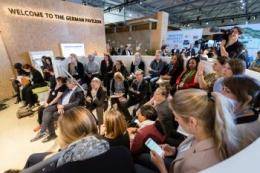 Photos: Friedemann Call, DLR Projektträger
Photos: Friedemann Call, DLR Projektträger
In a different setting, Dr. Sebastian Ferse (Coral reef expert and Head of the junior research group „Human Agency, Resilience and Diversity in Coral Reefs“ at ZMT) gave a talk during the „German Science Hour“ of the Federal Ministry of Education and Research (BMBF) at the German Pavilion. As part of the event „Our ocean future: marine ecosystems under climate change“, Dr. Ferse reflected on his research on the resilience of coral reef systems in Pacific Islands affected by global change.
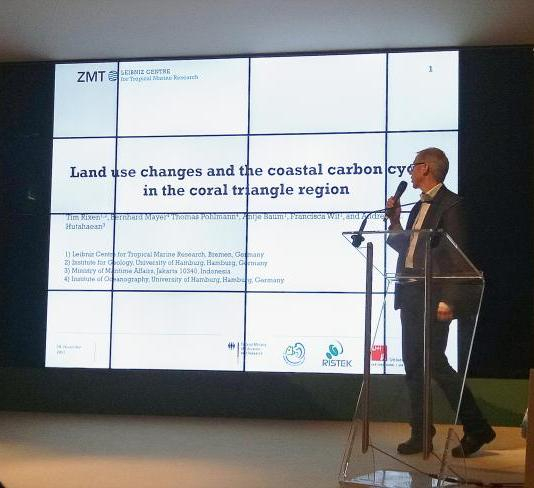
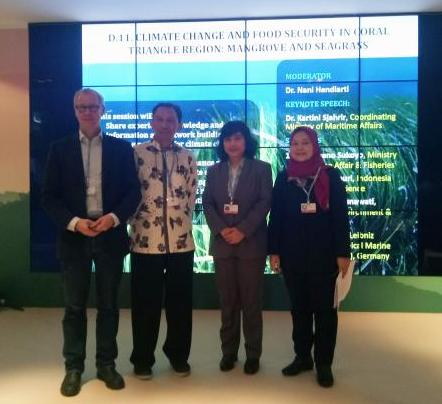
Dr. Tim Rixen, Head of the research group Carbon and Nutrient Cycling at ZMT, held a talk at the Indonesisian Pavilon asm part of a side event hosted by the Indonesian Fisheries Ministry on the topic of „Blue Carbon Initiative: Blue Growth for Sustainable Coastal Livelihood“. Dr. Rixen spoke about the effects of land use on coral reefs. During his talk “Land use changes and the coastal carbon cycle in the Coral Triangle“ he showed that the carbon cycles cannot be dived in terrestrial and marine when Paris climate goals are to be met and the future of the coral reefs is at stake.





